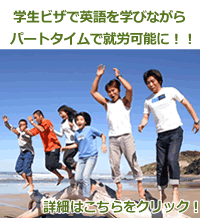Yukiko has been in New Zealand on a working holiday visa and is looking for a part-time job, both to earn some extra money and to get the chance to mix more with local people. She asks her Kiwi friend, Rebecca, for some tips.
Rebecca: “Hi, Yukiko, you said you wanted some advice about something. I’m all ears!”
Yukiko: “ Yes, I was thinking of trying to find some work so that I could get a little bit of money and maybe meet some more people”
Rebecca: “Awesome idea, girlfriend! There’s always work out there if you want it. In fact I can probably tee you up with a couple of contacts right now. You got a CV?”
Yukiko: “ What’s a CV?”
Rebecca: “Oh you might think of it as a “resume” which is a more common term in the USA”
Yukiko: “I have my Japanese resume, will that do?”
Rebecca: “Well, ummm, sort of yes and sort of no. For example, you don’t need to handwrite your CV as you do in Japan and you don’t need to tell them any stuff that isn’t relevant to the job that you’re looking for. Also, maybe put a photo, a smiling one of course, and don’t forget to list a couple of referees on it”
Yukiko: “Sorry, but what are “referees?”
Rebecca: “Awww, just people who will say nice things about you. Hey, you can put me down if you want. Promise I’ll say how great you are!”
Yukiko: “Can I get you to check my CV first before I send it?”
Rebecca: “Yeah, of course. But only if you buy me a coffee!”
Teacher Ray says:
Many people from Japan come here to learn English but, while studying in a good school will help you improve your confidence, working here can help with your fluency. Depending upon the visa that you hold you can look for part-time work.
There is always a need for staff in the restaurant and hospitality industry and even working in a Japanese restaurant might be an option.
Make sure that you have a short, concise CV to hand out and it is a good idea to target a few places rather than hand your CV to many different employers. They get so many people looking for work that they often don’t even look at them.
For their clients, Downtown Desk can provide a copy of a talk given by Teacher Ray on the subject of working in New Zealand so sign up with them and get this useful document!
Explanation
I’m all ears!
This is a popular expression to say that someone is listening eagerly to what the other person is about to tell them. Rebecca wants Yukiko to know that she has her full attention.
Awesome idea, girlfriend!
“Awesome” is used to describe anything (or anyone) that is “great” or “amazing”. Maybe you went to an “awesome party” or you’ve just met an “awesome new friend”. It was very common some years back and is still used by some Kiwis. It can even be used as an answer to a statement. For example:
“I’ve just passed my exams!” “Awesome!”
“Girlfriend” is a term used mostly by young women to show that they are good friends. Young men however would not call each other “boyfriend” but maybe “dude” or “mate”.
I can probably tee you up with a couple of contacts right now
This means that Rebecca has a couple of contacts that she can put Yukiko onto immediately. “tee up someone with something (or someone)” means to make an arrangement or introduce someone to someone else (“I can tee you up with a date for the party if you’d like me to?”)
You got a CV?
This is a very common “lazy” question form that Kiwis use. The fuller form would be:
“Have you got a CV?” or “Do you have a CV?
Other examples: “You got the time?” “You want a drink?” “You like pizza?”
Well, ummm, sort of yes and sort of no.
This is a response to a situation where the person is half right but also half wrong! Yukiko’s CV is a good start but she will need to change it to make it suitable for New Zealand. “sort of” can be heard in many situations. E.g.
“Is she your girlfriend?” “Sort of”
“He’s sort of rich” (He has a bit of money, but he’s not really rich)
Promise I’ll say how great you are!
Again, Rebecca is leaving out part of the sentence. A much fuller statement would be:
“I promise I’ll say how great you are!”
Enjoy your New Zealand experience, stay safe, look after your valuables and take advantage of our lovely country!
Teacher Ray (the “friendly” Kiwi)
次は解答編をUPするよ!

